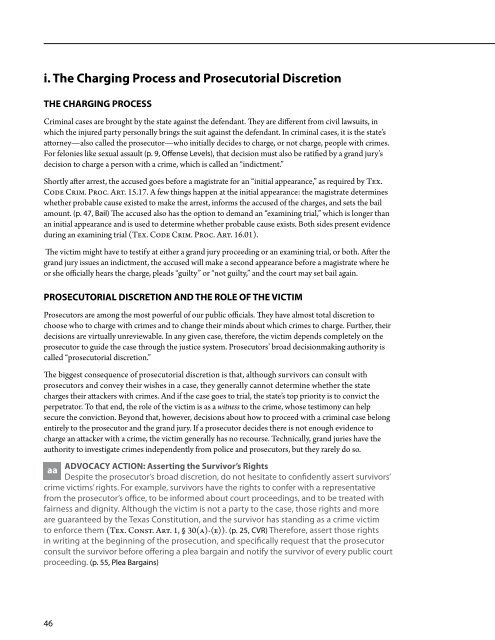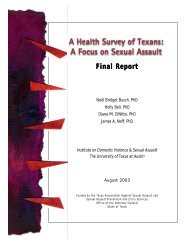Sexual aSSault LEGAL ADVOCACY MANUAL - Texas Association ...
Sexual aSSault LEGAL ADVOCACY MANUAL - Texas Association ...
Sexual aSSault LEGAL ADVOCACY MANUAL - Texas Association ...
You also want an ePaper? Increase the reach of your titles
YUMPU automatically turns print PDFs into web optimized ePapers that Google loves.
i. The Charging Process and Prosecutorial Discretion<br />
The Charging Process<br />
Criminal cases are brought by the state against the defendant. They are different from civil lawsuits, in<br />
which the injured party personally brings the suit against the defendant. In criminal cases, it is the state’s<br />
attorney—also called the prosecutor—who initially decides to charge, or not charge, people with crimes.<br />
For felonies like sexual assault (p. 9, Offense Levels), that decision must also be ratified by a grand jury’s<br />
decision to charge a person with a crime, which is called an “indictment.”<br />
Shortly after arrest, the accused goes before a magistrate for an “initial appearance,” as required by Tex.<br />
Code Crim. Proc. Art. 15.17. A few things happen at the initial appearance: the magistrate determines<br />
whether probable cause existed to make the arrest, informs the accused of the charges, and sets the bail<br />
amount. (p. 47, Bail) The accused also has the option to demand an “examining trial,” which is longer than<br />
an initial appearance and is used to determine whether probable cause exists. Both sides present evidence<br />
during an examining trial (Tex. Code Crim. Proc. Art. 16.01).<br />
The victim might have to testify at either a grand jury proceeding or an examining trial, or both. After the<br />
grand jury issues an indictment, the accused will make a second appearance before a magistrate where he<br />
or she officially hears the charge, pleads “guilty” or “not guilty,” and the court may set bail again.<br />
Prosecutorial Discretion and the Role of the Victim<br />
Prosecutors are among the most powerful of our public officials. They have almost total discretion to<br />
choose who to charge with crimes and to change their minds about which crimes to charge. Further, their<br />
decisions are virtually unreviewable. In any given case, therefore, the victim depends completely on the<br />
prosecutor to guide the case through the justice system. Prosecutors’ broad decisionmaking authority is<br />
called “prosecutorial discretion.”<br />
The biggest consequence of prosecutorial discretion is that, although survivors can consult with<br />
prosecutors and convey their wishes in a case, they generally cannot determine whether the state<br />
charges their attackers with crimes. And if the case goes to trial, the state’s top priority is to convict the<br />
perpetrator. To that end, the role of the victim is as a witness to the crime, whose testimony can help<br />
secure the conviction. Beyond that, however, decisions about how to proceed with a criminal case belong<br />
entirely to the prosecutor and the grand jury. If a prosecutor decides there is not enough evidence to<br />
charge an attacker with a crime, the victim generally has no recourse. Technically, grand juries have the<br />
authority to investigate crimes independently from police and prosecutors, but they rarely do so.<br />
<strong>ADVOCACY</strong> ACTION: Asserting the Survivor’s Rights<br />
Despite the prosecutor’s broad discretion, do not hesitate to confidently assert survivors’<br />
crime victims’ rights. For example, survivors have the rights to confer with a representative<br />
from the prosecutor’s office, to be informed about court proceedings, and to be treated with<br />
fairness and dignity. Although the victim is not a party to the case, those rights and more<br />
are guaranteed by the <strong>Texas</strong> Constitution, and the survivor has standing as a crime victim<br />
to enforce them (Tex. Const. Art. 1, § 30(a)-(e)). (p. 25, CVR) Therefore, assert those rights<br />
in writing at the beginning of the prosecution, and specifically request that the prosecutor<br />
consult the survivor before offering a plea bargain and notify the survivor of every public court<br />
proceeding. (p. 55, Plea Bargains)<br />
46
















